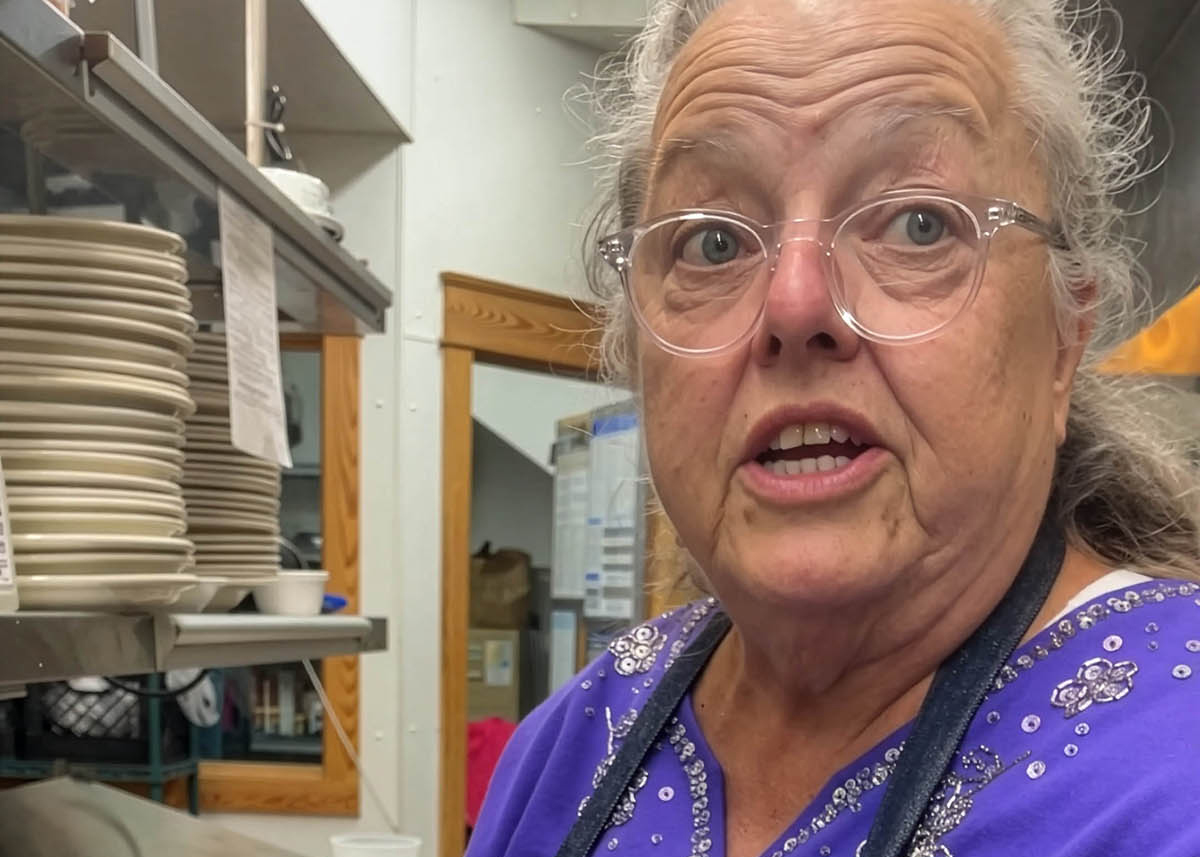MANTEO — Amidst the weight of mid-morning heat and a balmy southwest breeze, Winborne Evans and I stand knee deep in horseweed, swatting strawberry flies. Evans’ six honeybee hives lay feet from us, methodically buzzing deep within the lowlands of Roanoke Island.
Her daughter, Francesca, darts between the hives, anxious to don her bee suit. Evans gazes ahead, her eyes resting on the hive boxes, plastered with mottled patterns of primary color.
Supporter Spotlight
“Frannie paints the boxes,” she smiled.
Within minutes, the mother-daughter apiarist team is clad in their canvas suits. Evans delicately slides open the waxy edges of her first hive, as the air around us becomes littered with tiny whirs of yellow and black.
The Making of an Apiarist
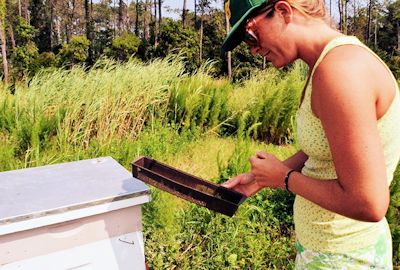 While recovering from an injury, Winborne Evans started reading up on beekeeping. It soon became her passion. Photo: Ladd Bayliss |
Evans serendipitously fell into the art of beekeeping nearly a decade ago. While living in Asheville, the Dare County native acquired a challenging combination of hardships: a devastating house fire and a badly injured knee.
Evans’ newly found downtime as a byproduct of her injury lured her to the public library with two titles in mind: car repair and beekeeping.
“Those were two things I’d always wanted to learn more about,” remembered Winborne, “but I could never find the time.”
Supporter Spotlight
It was clear which subject struck a chord.
As an ardent response to the mass complexities of apiculture, Evans threw herself into the practice by working for a local Asheville bee inspector in exchange for his wisdom. Her new knowledge of beekeeping was forced to application when she stumbled upon her first wild honeybee swarm.
“He looked at me and said, if you want them, you’ve got to get them,” laughed Evans.
One-legged, Evans clobbered up a tree to retrieve the swarm. From this first batch of wild-caught honeybees, Evans began her own organic apiary in Asheville, which still in operation today.
In addition to a bachelor of science degree in environmental science and conservation biology from Warren Wilson College near Asheville, Evans furthered her knowledge of bees by becoming certified in “bee sting therapy,” or apitherapy. As an alternative method used to treat a suite of ailments from arthritis to alcoholism, apitherapy is founded on the notion that bees (and their bi-products) are medicine.
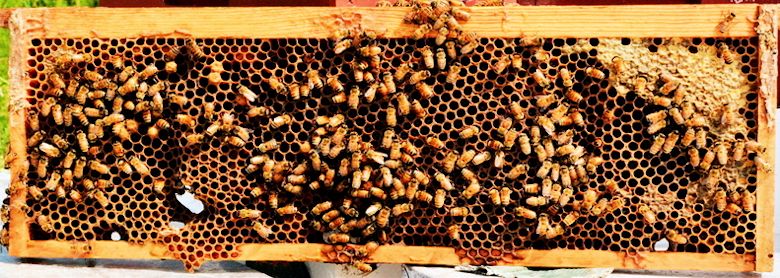
The Great Apis
“You want some?” says Evans.
From the bottom of her hive, she passes me a plastic tray littered with deep yellow and orange pieces of pollen. The powdery nips are sweet to the taste, full of carbohydrates and protein used by the hive, as well as by some practices in integrative medicine.
While the beehive may appear to be a simplistic place from the outside, division of labor and hierarchy create a truly intricate environment. Originally from Europe, honeybees were brought to North America by early settlers. With over 20,000 known species of bees, the genus Apis includes the approximate seven honeybee species that our food production largely depends on.
“Each bee has their own specific job,” said Evans, continuing with her hive tool, prying open the top of another box.
Honeybees are divided into three categories within the hive: queen, drones, and workers. There is typically only one queen, whose sole responsibility is to reproduce; the male drones are responsible for fertilizing the queen.
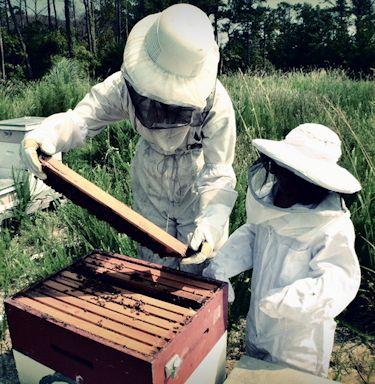 Winborne Evans and her daughter, Francesca, remove one of the trays from a hive. Photo: Ladd Bayliss |
At the entrance, a row of honeybees danced from side to side, their wings whirring. “These worker bees are responsible for keeping the hive cool inside,” point Evans.
If temperature control for upwards of 50,000 bees were not large enough of a task, the female worker bees are responsible for gathering pollen, building honeycomb, feeding larvae and cleaning the hive. Each worker does all of these tasks over the course of their lifetime.
Once the top of the hive is lifted, the vertically-stored trays filled with honeycomb are removed one by one, as the hive’s inhabitants slowly funnel out into the mid-morning heat. On this particular day, we are privileged enough to spot the queen of one of Evans’ hives.
“Frannie! Look, the queen!” Evans spoke excitedly as her canvas-gloved finger followed the master of the hive.
If properly cared for, queens are capable of producing nearly 2,000 eggs per day. Francesca’s eye intently followed the queen as she walked the honeycombs of her domain, the smaller workers scattering with her every movement.
Pollinator Threats
The importance of the local pollinator is staggering. Over one-third of the food we consume depends on the pollination process. And, while all pollinators are important, the honeybee holds the true crux of our food systems as they are considered to conduct most of these pollination duties. Recent, unparalleled declines in honeybee populations have caused apiarists like Evans to worry.
Several years ago, Colony Collapse Disorder, or CCD, was the name given to the increase in disappearance of honeybee populations across the world, specifically in North America. CCD is idiopathic in nature, given the diversity of contributing factors ranging from weather patterns, predators, parasites or pesticides.
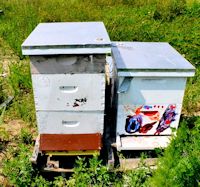 Francesca live to paint the hives in bright colors. Photo: Ladd Bayliss |
“My greatest defense as an organic beekeeper is a strong hive,” said Evans.
Still, honeybees can travel an average of four miles for pollen, making it often hard for pesticides to be avoided, says Evans. Most common lawn and garden chemicals are harmful to these beneficial pollinators making the odds of colony collapse that much higher – especially when combined with other contributing environmental factors.
As Evans sees it, the solution to the problem lies in education. And, from a tenacious, one-limbed tree climb that transformed into flourishing beehives on Roanoke Island, it’s clear that Evans’ initial hardship served as swift evolution into a life’s work.
“Honeybees need humans to survive,” smiled Evans. “We’ve got to remember what they do for us, as well as what we do for them.”
For questions on becoming a backyard beekeeper, Just Bee, LLC is happy to help. Email Winborne.




